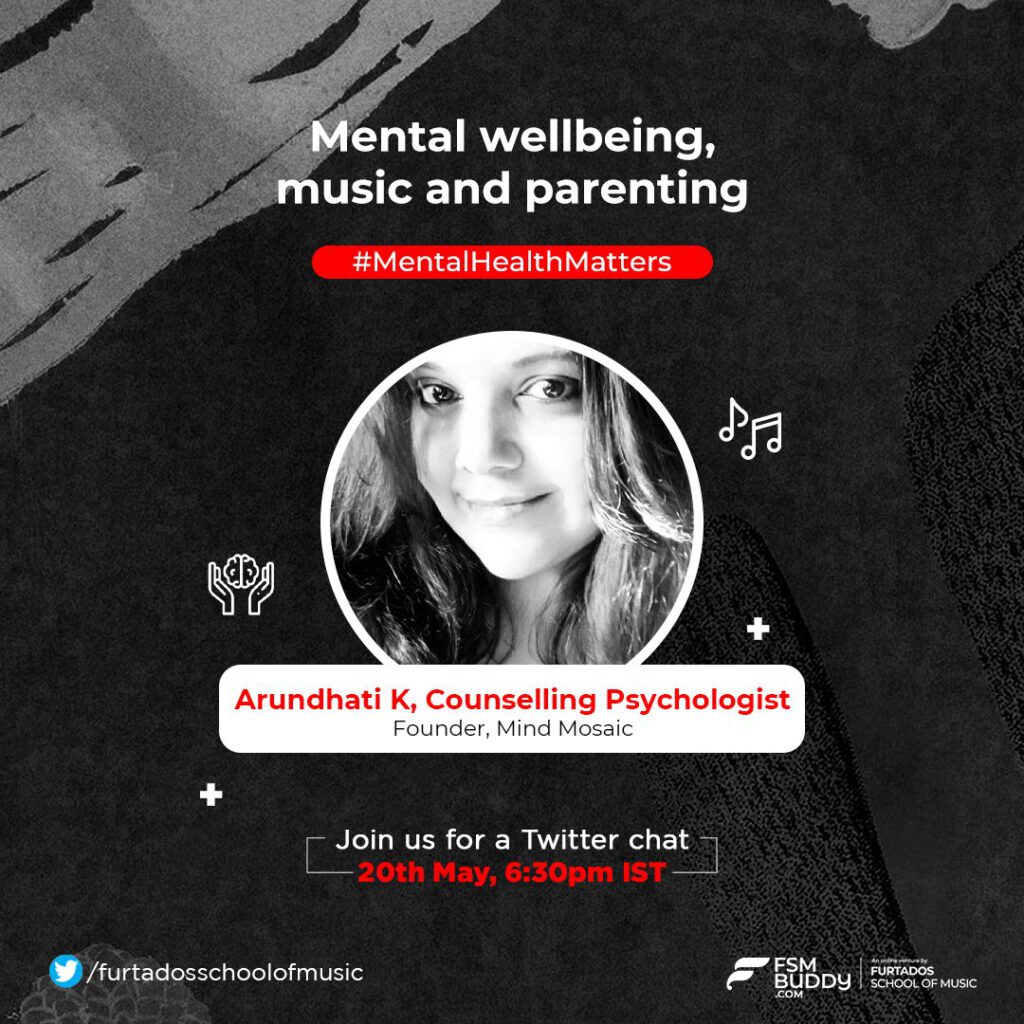
An interview with Furtardo School of Music on 20th May, 2021 at 6.30 pm discussing ways in which one can better manage anxiety for themselves and their children and how music can play a pivotal role in ensuring good mental health.
- How do you approach counselling/therapy for Kids? #MentalHealthMatters
Just like adults, therapy helps a child explore their emotions and receive support. With children, play therapy, talk therapy, parent-child therapy and behavioural therapy works excellently. Children are faced with developmental milestone’s related challenges. As a therapist, I first explain my role as a therapist and then discuss their concerns and emotions. Children need a safe space to be heard and feel understood.
- What is your advice to parents facing mental health concerns, their own or of their kids? #MentalHealthMatters
Parents play an important role in the child’s mental health. Bad mental health affects how a person thinks and behaves. Parents need to show their children how to solve problems. They should communicate their own feelings, listen and respect the child’s feelings. A child needs a safe and a positive home environment. Parents should take interest in the child’s activities, show a lot of love and positive reinforcement. They could teach the child how to relax when they feel anxious and discuss various problem solving ideas. Look out for warning signs and be a good role model and take care of their own mental health and seek professional help for themselves and/or their children when necessary.
- We recently did a survey and 95% of the respondents said that music helped them relax and free them of anxiety – what are your thoughts on this? #MentalHealthMatters
Music does help reduce stress. It relaxes the mind and the body. Music therapy is also a form of therapy. It helps the client maintain their psychological, social and physical well-being. It encourages a positive change in the person’s mood. According to the study done by the neuropsychologist Dr. David Lewis-Hodgson, listening to music reduces anxiety upto 65 percent. The pitch, the tune, the tempo affects the different areas of the brain. It also affects our physiological state such as the blood pressure. Certain sounds can also cause anxiety like our message or email notifications, phone ring or the doorbell.
- As adults we spend most of our time at the workplace which has its toll. How can our mental wellbeing at work impact our mental wellbeing OF home? Can you share some examples? #MentalHealthMatters
Adults need to manage their time well. Most of our time is spent at the workplace or currently working from home. This takes a toll on our physical and mental health.
Adult find it difficult to prioritize their needs or the needs of the family. This can lead to lack of communication with their loved ones, neglecting self and others, stress-eating and struggling to maintain a balance between home and work.
Recently, I have come across clients discussing their children showing attention seeking behavior as they feel neglected or marital discord between couples. The stressful environment leads to hypertension, insomnia, etc. It becomes a vicious cycle with physical and mental health affecting each other.
- The survey also indicates that playing a musical instrument helped improve mood after long working hours or after long hours of study. Do you suggest #music therapy to parents and kids? #MentalHealthMatters
Music therapy has a lot of health benefits. I recommend music therapy because it relaxes the muscle, it improves cardiac output, lowers blood pressure, helps visual imagery and is a good stimulus to feel happy, energetic, calm and comfortable. Music therapy has been known to reduce anxiety, focus on positive thoughts and promote relaxation. It can be conducted by playing different kind of music, writing songs, playing instruments and guided imagery.
- What is the importance of adding mental health modules & music in school curriculums? #MentalHealthMatters
We need to include mental health modules in the school curriculum. Children need to be aware about the importance of their mental well-being. This will help remove the stigma attached to mental health problems and seeking professional help. The school should have a mental health professional to help students who may have emotional or behavioural disorders. Though music is included in the curriculum of some schools, I personally feel schools should promote early musical training. This helps in developing the areas of the brain related to language and reasoning.
It also helps the children develop their self-esteem. Musical training also helps children with special needs.
Bonus Question: Can you tell us a music genre that instantly puts you at ease?
I love listening to Hindustani Classical and Ambient Pop. It helps me relax instantly.
